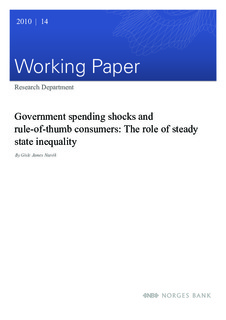| dc.contributor.author | Natvik, Gisle James | |
| dc.date.accessioned | 2018-05-08T07:18:17Z | |
| dc.date.available | 2018-05-08T07:18:17Z | |
| dc.date.issued | 2010 | |
| dc.identifier.isbn | 978-82-7553-564-9 | |
| dc.identifier.issn | 1502-8143 | |
| dc.identifier.uri | http://hdl.handle.net/11250/2497449 | |
| dc.description.abstract | Galí, López-Salido, and Vallés (2007) suggest that because part of the population follow a rule-of-thumb by which they spend their entire disposable income each period, private consumption responds positively to deficit-financed increases in government spending. Key to this result is a centralized labor market. I show that the ability to explain the positive consumption response as a consequence of rule-of-thumb behavior hinges on the arbitrary assumption that wealth is redistributed across households in steady state. Inequality leads to equilibrium indeterminacy and undermines the theoretical foundation of the centralized labor market. | nb_NO |
| dc.language.iso | eng | nb_NO |
| dc.publisher | Norges Bank | nb_NO |
| dc.relation.ispartofseries | Working Papers;14/2010 | |
| dc.rights | Attribution-NonCommercial-NoDerivatives 4.0 Internasjonal | * |
| dc.rights.uri | http://creativecommons.org/licenses/by-nc-nd/4.0/deed.no | * |
| dc.subject | JEL: E32 | nb_NO |
| dc.subject | JEL: E62 | nb_NO |
| dc.subject | rule-of-thumb consumers | nb_NO |
| dc.subject | wealth inequality | nb_NO |
| dc.subject | government spending | nb_NO |
| dc.subject | indeterminacy | nb_NO |
| dc.title | Government Spending Shocks and Rule-Of-Thumb Consumers: The Role of Steady State Inequality | nb_NO |
| dc.type | Working paper | nb_NO |
| dc.description.version | publishedVersion | nb_NO |
| dc.subject.nsi | VDP::Samfunnsvitenskap: 200::Økonomi: 210::Samfunnsøkonomi: 212 | nb_NO |
| dc.source.pagenumber | 30 | nb_NO |

